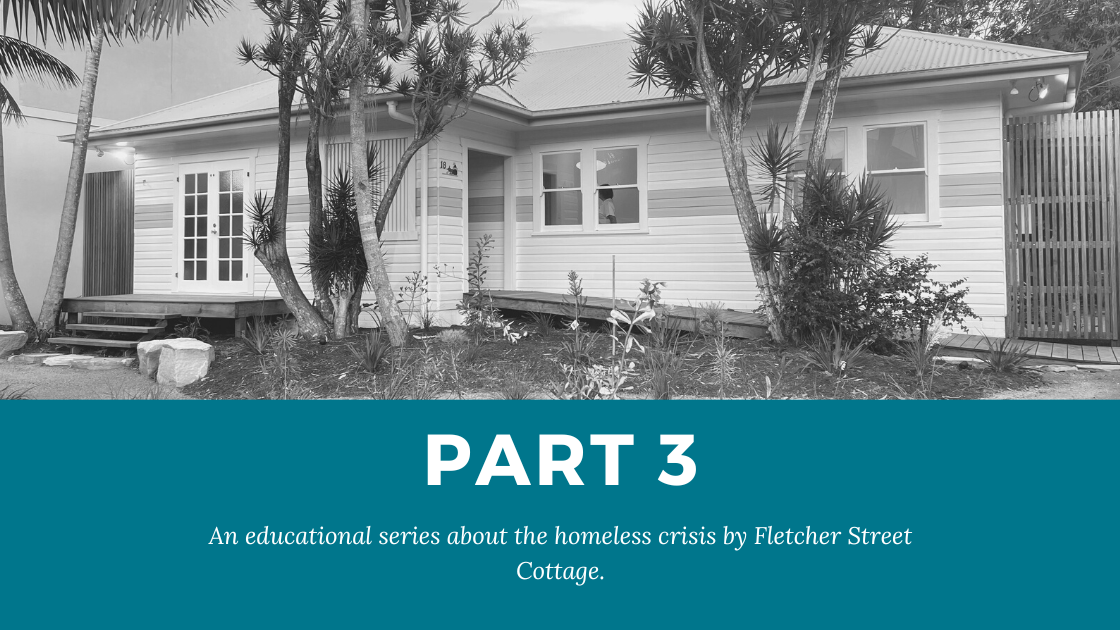A Series on Homelessness by Fletcher Street Cottage
Fletcher Street Cottage is Byron's homeless hub, providing a safe and welcoming space for individuals and families at risk of homelessness, and those already sleeping rough, to access connection and broader support.
Homelessness remains a pressing societal issue that has far-reaching implications for individuals, communities, and nations at large. While various strategies have been employed to tackle this challenge, a growing consensus suggests that an innovative and compassionate approach known as 'Housing First' could hold the key to addressing homelessness in a more effective and holistic manner. This blog post delves into the concept of the Housing First approach, its core principles, successful implementations, challenges, and the potential it holds to reshape how societies approach homelessness.
The Essence of Housing First
A paradigm shift is underway in how societies approach homelessness. One groundbreaking approach that has been gaining traction is the Housing First strategy. Instead of placing stringent prerequisites on individuals experiencing homelessness, Housing First emphasises immediate access to stable housing. The central tenet of this approach is that housing is a fundamental human right, and addressing homelessness should start with providing individuals a safe and permanent place to call home. This contrasts with traditional models that required individuals to meet certain criteria or address underlying issues such as mental health or substance abuse before being eligible for housing assistance.
The Core Principles
Housing First is built on a set of principles that prioritise housing stability and individual needs. These principles include:
- Rapid Rehousing: Providing individuals with immediate access to long-term housing without the need for meeting specific readiness criteria.
- Consumer Choice and Control: Allowing individuals to have agency in choosing their housing and the services they require.
- Separation of Housing and Support Services: Recognising that housing stability should not be contingent upon participation in support services.
- Recognition of Ongoing Recovery: Acknowledging that recovery is a continuous journey, and addressing underlying issues is more effective when individuals have stable housing.
- Community Re-Integration: Ensuring that individuals are housed in a manner that integrates them into the broader community, without differentiation from other housing options.

Success Stories of Housing First
Around the world, Housing First approaches have yielded impressive results. For instance, Finland's Housing First strategy has dramatically reduced the number of rough sleepers, from 3,000 in 2010 to 1,000 in 2019. In the United States, a study comparing traditional housing services with the Housing First program known as Pathways to Housing found that 88% of those in the Housing First program retained their housing for two years, compared to 47% in other programs.
Challenges and Limitations
While Housing First shows promise, its broader adoption and implementation face challenges. A crucial constraint is the shortage of available affordable housing, which prevents many individuals vulnerable to homelessness from being accommodated. Additionally, fragmented responsibilities between different levels of government and lack of wrap-around support services can hinder the successful implementation of Housing First programs.
Looking Ahead: Potential and Impact
Despite challenges, the Housing First approach presents an opportunity to revolutionise the way societies address homelessness. By prioritising housing stability and offering comprehensive support services, Housing First can lead to not only improved individual outcomes but also cost savings for governments. The success of Housing First programs in various contexts, from addressing chronic homelessness to helping those reentering society from the criminal justice system, underscores its adaptability and potential impact.
In the battle against homelessness, the Housing First approach offers a glimmer of hope and a fresh perspective. By focusing on immediate housing and providing comprehensive support services, Housing First challenges traditional notions of addressing homelessness and offers a more humane and effective way forward. As communities and governments continue to grapple with this complex issue, adopting the principles of Housing First could mark a significant step towards creating a society where everyone has a place to call home.
Donate
Donate now to support Byron's homeless at Fletcher Street Cottage: www.giveheart.com.au



.jpg)

